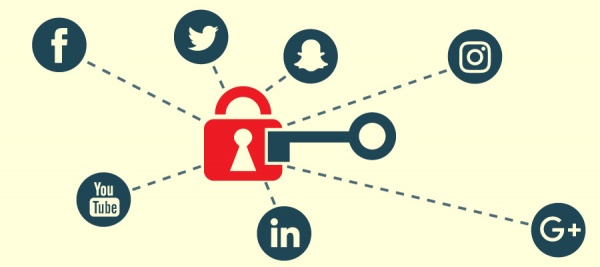Digital Privacy associated with advertisements
Privacy is the ability of an individual or group to seclude themselves or information about themselves, and thereby express themselves selectively. [1] Now entering the technology age, Digital privacy becomes more of a concern since people engage in online activities more and more frequently. Digital privacy is often used in contexts that promote advocacy on behalf of individual and consumer privacy rights in e-services and is typically used in opposition to the business practices of many e-marketers, businesses, and companies to collect and use such information and data. [2] Entering Internet Age, digital security and privacy become more closely related to every individual.
Advertising is a marketing communication that employs an openly sponsored, non-personal message to promote or sell a product, service or idea. Sponsors of advertising are typically businesses wishing to promote their products or services.
[3] Advertising changes its form in time. In the Internet Age, business gradually switch their advertisement from traditional media to new media, social media advertising for example. The main internet advertisement companies include Alphabet Inc. (Google, YouTube) and Meta Platforms Inc. (Facebook, Instagram).
Internet Advertising is closely associated with Digital Privacy these days. Companies use technologies like cookies to get information of the user and use that information to better sell their advertisements. Ethical issues like should companies make profit of user privacy from advertisement always arise these days. "Targeted adverts are one of the biggest moneymakers for Facebook. By utilising the vast amount of personal data from the 1.71 billion active users, the social media giant can tailor adverts to suit your situation." [4]
Contents
Digital Privacy And Personal Data Collection
The advertisement distribution algorithm relies heavily on personal information these days. The wide application of recommender system, a machine learning-based content delivery algorithm, recommends new content by using the knowledge of user preference. The data used to predict user preference can be user habit or even sensitive data like address and search history. Some companies even benefit from selling these personal information. The ethical concern of digital privacy is highly related to different advertisement algorithms. The concept of Information transparency [5] was introduced to measure how much privacy has the platform exposed or utilized. In most of social media platforms, user information is collected unconsciously by the platform in the form of cookies, registration information, user habit, and etc. For example, most of platforms used to not have the option to turn off cookies; now even they provide the option since the law required them to do so, most people won't care and choose to accept all cookies for their convenience. In the perspective of Information transparency, these big tech companies are definitely not transparent enough when they try to collect user information. Users usually don't know how much of their private information has been exposed to the social media platform. For example, in the Yahoo! data breaches [6] , a lot of user's private information has been exposed during this attack.
Data Mining
Social Media can get to know a user's private information by data mining. Everyone can be tracked by the trail the leave on the internet. Users provide personal information that can include their name, birthdate, geographic location, and personal interests when they make an account. Additionally, companies collect data on user behaviors about how users interact on the website. For the most time, these information will be used to better serve customers or better deliver advertisements to target customers. However, companies sometimes even share users’ data with third-party entities without users’ knowledge or consent. [7]
Privacy concerns
In a 2014 survey, researchers found that 91% of Americans “agree” or “strongly agree” that people have lost control over how personal information is collected and used by all kinds of entities. [8]
In the survey, 80% of social media users said they were concerned about advertisers and businesses accessing the data they share on social media platforms, and 64% said the government should do more to regulate advertisers. [9]
In another survey last year, researchers found that just 9% of social media users were “very confident” that social media companies would protect their data. About half of users were not at all or not too confident their data were in safe hands. 61% of Americans in the survey have said they would like to do more to protect their privacy. Additionally, two-thirds have said current laws are not good enough in protecting people’s privacy, and 64% support more regulation of advertisers. [10]
Advertisement Case studies
Advertisement are widely used by large tech companies and they have different strategies and algorithms to distribute the content. Here are some case studies of typical advertisement practices.
Google Ads
Google LLC is an American multinational technology company that specializes in Internet-related services and products, which include online advertising technologies, a search engine, cloud computing, software, and hardware. Google generates most of its revenues from advertising. This includes sales of apps, purchases made in-app, digital content products on Google and YouTube, Android and licensing and service fees, including fees received for Google Cloud offerings. [11] More than 80% of Alphabet’s revenue comes from Google ads, which generated $147 billion in revenue last year. Google has been the market leader in online advertising for well over a decade and is expected to command nearly a 29% share of digital ad spending globally in 2021. [12] So Google nearly makes money entirely from advertisement. All other free services like Gmail, Google Drive, Google Map are used to better sell advertisements. The famous saying goes "if you don't pay for the product you are the product". Google use a specific sealed second price auction algorithm to sell their ads. For example, Google determine the ranking of advertisement when a user search with a certain term by their price and relativeness to the searching term. Google collect user data through a lot of ways including Google products like Gmail and Google Map, search histories to indicate user interest and preference, and google account to track personal and geological information.
Google places one or more cookies on each user's computer, which is used to track a person's web browsing on a large number of unrelated websites, and track their search history. If a user is logged into a Google service, Google also uses the cookies to record which Google Account is accessing each website and doing each search. Originally the cookie did not expire until 2038, although it could be manually deleted by the user or refused by setting a browser preference.[13] As of 2007, Google's cookie expired in two years, but renewed itself whenever a Google service is used.[13] As of 2011, Google said that it anonymizes the IP address data that it collects, after nine months, and the association between cookies and web accesses after 18 months.[14] As of 2016, Google's privacy policy does not promise anything about whether or when its records about the users' web browsing or searching are deleted from its records.[14]
Google shares this information with law enforcement and other government agencies upon receiving a request. The majority of these requests do not involve review or approval by any court or judge.[15]
YouTube Ads
YouTube is an American online video sharing and social media platform owned by Google. [16] Similar to Facebook, YouTube is a free website that earns revenue through advertising. Advertisers spend thousands of dollars to have their advertisements featured on top videos. YouTube enforces strict community and technical guidelines for all of its advertisements; the site aims to be fair and consistent with its policies in order to benefit its users, advertisers, and partners. YouTube reserves the right to reject any advertisement from the site that is deemed inappropriate or intrusive, and refunds are not issued for promotions in which the related advertisements disabled, or suspended due to policy violations. [17] YouTube sell their advertisement in a different way than Google as they insert advertisements at the beginning or middle of a video. Also, the censorship is more rigorous for YouTube advertisement to not include strong violence, language, sexual content, and "controversial or sensitive subjects and events, including subjects related to war, political conflicts, natural disasters and tragedies, even if graphic imagery is not shown", unless the content is "usually newsworthy or comedic and the creator's intent is to inform or entertain". [18] YouTube collects user information through search records, video preference, and video interactions. Then they promote advertisements fitting user interest.
Facebook Ads
Facebook is an American online social media and social networking service owned by Meta Platforms. [19] Facebook has often been criticized over issues such as user privacy (as with the Facebook–Cambridge Analytica data scandal), political manipulation (as with the Russian interference in the 2016 United States elections#Social media and Internet trolls), mass surveillance,[20] psychological effects such as social media addiction and low self-esteem, and content such as fake news, conspiracy theories, copyright infringement, and hate speech.[21] Commentators have accused Facebook of willingly facilitating the spread of such content,[22][23][24][25] as well as exaggerating its number of users to appeal to advertisers.[26]
Facebook Ads has received a lot of criticism regarding their bias and discrimination in recommendation algorithms. Results such as minorities receiving a higher percentage of low-cost housing ads, and women receiving more ads for secretary and nursing jobs [27]. Facebook’s sale of surveillance-based advertising that exploits its “deep trove of data” has antitrust implications in addition to privacy concerns, the FTC said. [28] With only Facebook to turn to for that data, advertisers lose out on the lower prices and increased quality and innovation that come with additional competition, the agency said. Last year, Facebook generated revenues of more than $85 billion and profits of more than $29 billion from its advertisements, according to the complaint. [29]
In 2010, the The Wall Street Journal found that many of Facebook's top-rated apps—including apps from Zynga and Lolapps—were transmitting identifying information to "dozens of advertising and Internet tracking companies" like RapLeaf. The apps used an HTTP referer that exposed the user's identity and sometimes their friends' identities. Facebook said that "While knowledge of user ID does not permit access to anyone’s private information on Facebook, we plan to introduce new technical systems that will dramatically limit the sharing of User ID’s". A blog post by a member of Facebook's team further stated that "press reports have exaggerated the implications of sharing a user ID", though still acknowledging that some of the apps were passing the ID in a manner that violated Facebook's policies.[30][31]
It has been highly publicised that users feel the app listens to private conversations without their consent, in order to serve up customized advertisements. Many users report being shown advertisements for products which they have only spoken about but have not searched for, "liked" on Facebook, or even ever purchased, leading to the belief that Facebook listens to conversations.[32]
Facebook has denied for years that it listens to conversations and in turn releases ads based on them, however Facebook has been shown to have lied about their policies in the past.[33] In 2016, Facebook stated "Facebook does not use your phone's microphone to inform ads or to change what you see in News Feed." a spokeswoman said, "some recent articles have suggested that we must be listening to people's conversations in order to show them relevant ads. This is not true. We show ads based on people's interests and other profile information, not what you’re talking out loud about."[34]
Instagram Ads
Ethical Concerns
References
- ↑ https://en.wikipedia.org/wiki/Privacy
- ↑ https://en.wikipedia.org/wiki/Digital_privacy#:~:text=Digital%20privacy%20is%20often%20used,use%20such%20information%20and%20data.
- ↑ https://en.wikipedia.org/wiki/Advertising
- ↑ https://www.privacytrust.com/blog/how-facebook-makes-money-from-personal-data.html
- ↑ Turilli, Matteo, and Luciano Floridi (2009). "The Ethics of Information Transparency." Ethics and Information Technology. 11(2): 105-112. doi:10.1007/s10676-009-9187-9.
- ↑ https://en.wikipedia.org/wiki/Yahoo!_data_breaches
- ↑ https://sopa.tulane.edu/blog/key-social-media-privacy-issues-2020
- ↑ https://www.pewresearch.org/fact-tank/2018/03/27/americans-complicated-feelings-about-social-media-in-an-era-of-privacy-concerns/
- ↑ https://www.pewresearch.org/fact-tank/2018/03/27/americans-complicated-feelings-about-social-media-in-an-era-of-privacy-concerns/
- ↑ https://www.pewresearch.org/fact-tank/2018/03/27/americans-complicated-feelings-about-social-media-in-an-era-of-privacy-concerns/
- ↑ https://en.wikipedia.org/wiki/Google
- ↑ https://www.cnbc.com/2021/05/18/how-does-google-make-money-advertising-business-breakdown-.html
- ↑ 13.0 13.1 Agger, Michael · (October 10, 2007) · Google's Evil Eye: Does the Big G know too much about us? · work · 01-27-2022
- ↑ 14.0 14.1 "Privacy FAQ", Google, accessed October 16, 2011 and December 20, 2016
- ↑ "Transparency Report: User Data Requests", Google. Retrieved December 20, 2016.
- ↑ https://en.wikipedia.org/wiki/YouTube
- ↑ http://si410wiki.sites.uofmhosting.net/index.php/YouTube#cite_note-policies-19
- ↑ Robertson, Adi (September 1, 2016). "Why is YouTube being accused of censoring vloggers?". The Verge. Vox Media. Retrieved March 25, 2017.
- ↑ https://en.wikipedia.org/wiki/Facebook
- ↑ lastname, firstname · (May 24, 2018) · Facebook accused of conducting mass surveillance through its apps · work · 01-27-2022
- ↑ Mahdawi, Arwa · (December 21, 2018) · Is 2019 the year you should finally quit Facebook? | Arwa Mahdawi · work · 01-27-2022
- ↑ Medrano, Kastalia · (January 25, 2018) · Facebook Spreads Viral Fake News Story About Vaccines · work · 01-27-2022
- ↑ Raphael, Rina · (February 4, 2019) · A shockingly large majority of health news shared on Facebook is fake or misleading · work · 01-27-2022
- ↑ lastname, firstname · (July 13, 2018) · Facebook will not remove fake news - but will 'demote' it · BBC News · 01-27-2022
- ↑ Funke, Daniel · (March 6, 2019) · Forget fake news stories. False text posts are getting massive engagement on Facebook. · work · 01-27-2022
- ↑ Claburn, Thomas · (August 17, 2018) · Facebook flat-out 'lies' about how many people can see its ads – lawsuit · work · The Register · 01-27-2022
- ↑ Hao, Karen. “Facebook's Ad-Serving Algorithm Discriminate by Gender and Race.” MIT Technology Review, 5 Apr. 2019, www.technologyreview.com/.
- ↑ https://news.bloomberglaw.com/antitrust/facebook-haunted-by-privacy-issues-as-ftc-boosts-antitrust-case
- ↑ https://news.bloomberglaw.com/antitrust/facebook-haunted-by-privacy-issues-as-ftc-boosts-antitrust-case
- ↑ lastname, firstname · (October 18, 2010) · Facebook in Privacy Breach · work · 01-27-2022
- ↑ Takahashi, Dean · (October 17, 2010) · WSJ reports Facebook apps — including banned LOLapps games — transmitted private user data · work · 01-27-2022
- ↑ lastname, firstname · (2019-06-28) · Is Facebook listening to me? Why those ads appear after you talk about things · work · 01-27-2022
- ↑ lastname, firstname · (date) · [1] · work · 01-27-2022
- ↑ lastname, firstname · (2019-09-06) · Facebook isn't secretly listening to your conversations, but the truth is much more disturbing · work · 01-27-2022




